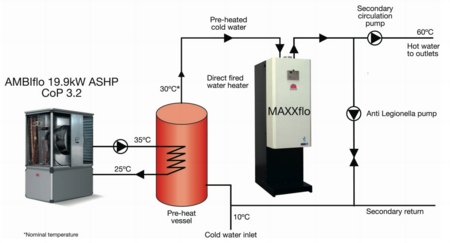Domestic hot water meets the Renewable Heat Incentive

With the recent announcement of the Renewable Heat Incentive (RHI), it is anticipated that demand for low- to zero-carbon technology (LZC) within the building-services sector will increase. Jeff House looks at the opportunities for technologies such as solar thermal and heat pumps.
It is widely accepted that installing separate systems to provide space heating and hot water for a property can deliver the most efficient building-services solution. This approach allows the use of appliances closely matched to the load of each service and negates seasonal inefficiencies typically associated with calorifiers heated by main heating plant running at partial load.
Indeed, recent advances in building insulation levels and thermal efficiency driven by Building Regulations Part L have seen hot water overtake space heating as the predominant load in many applications, hence the popularity of direct-fired water heaters.
With the best gas-fired water heaters now reaching efficiencies of up to 109% (net) we are reaching the limit of what this type of technology can achieve in isolation. However, integrating LZC (low and zero carbon) into a pre-heat solution can dramatically increase overall system efficiency, whilst lowering fuel input and CO2 emissions.
The most mature and widespread LZC associated with hot-water production is solar thermal. In commercial applications, this technology can be integrated into a pre-heat store, thereby raising the temperature of incoming mains cold water prior to feeding through a direct-fired water heater. When correctly applied, a solar fraction of 40% can be achieved (40% of annual hot-water production from solar energy). Clearly, this is an attractive proposition in terms of running costs and CO2 reduction.
A similar approach can be used to integrate heat pumps, again providing pre-heat. This is a particularly attractive use of heat pumps, as this technology works best at lower supply temperatures. Therefore, a heat pump can be used to raise incoming mains cold water from around 5 to 10°C up to around 35°C, with a water heater providing the final input to reach the required delivery temperature. By controlling the heat pump to operate at this temperature regime, the efficiency, or co-efficient of performance (COP), is maximised — thereby offering the optimum use of fuel input to the overall system.
Until recently, CO2 emissions from buildings and the integration of LZC have been predominantly the focus of the new-build sector, driven by strict compliance targets in Building Regulations — with an end target of ‘zero-carbon’ development by 2019.
If we are to meet the long-term carbon-reduction targets, which we are legally bound as a nation to deliver (an eventual 80% reduction in emissions by 2050), it is essential that the efficiency of the existing building stock is considerably improved. To this end, Government is keen to accelerate the uptake of LZC technology by property owners and operators, hence the introduction of a number of schemes including Feed in Tariffs and the Renewable Heat Incentive.
The recently published Renewable Heat Incentive (RHI) offers a financial incentive to install LZC heating technology in England, Wales and Scotland, with commercial installations supported from the outset. It is expected that RHI will drive the demand for LZC as, combined with fuel savings, a considerable return on investment can be realised — thereby making installation of such technologies a viable option for building owners.
Administered by Ofgem, RHI will offer quarterly payments to owners of renewable-heating installations based on a metered approach with tariff levels per kWh of generated heat varying by technology type; for example useful heat generated by a solar thermal array will be eligible for a tariff rate of 8.5 pence/kWh.

As payments are based on metered performance of the technology type in question, considered and correct application is critical to delivering measurable, real life performance.
Eligibility for RHI will depend upon technology type, size of installation and will require product and installer to be registered under the Micro-generation Certification Scheme (MCS) for systems with a rated thermal output lower than 45 kW.
At this stage, from the technology types mentioned previously, solar thermal and ground-source heat pumps are supported by RHI; unfortunately, air-source heat pumps are not included from the outset, although this is subject to review in 2012.
Air-source heat pumps are a mature and established technology delivering proven energy and carbon reduction in DHW pre-heat applications, which makes their exclusion from the initial launch of RHI a disappointing decision.
Not all buildings are suitable for a solar-thermal installation. It is often the case that ground-source heat pumps can prove too disruptive or costly to business operators owing to the extensive ground works involved. Air-source heat pumps are suited to a far wider range of properties, as the location of external system components is far more flexible.
It is imperative that air-source heat pumps are included within RHI at the next review to enable designers to provide integrated system solutions for all applications.
Jeff House is applications manager for Baxi Commercial Division.







